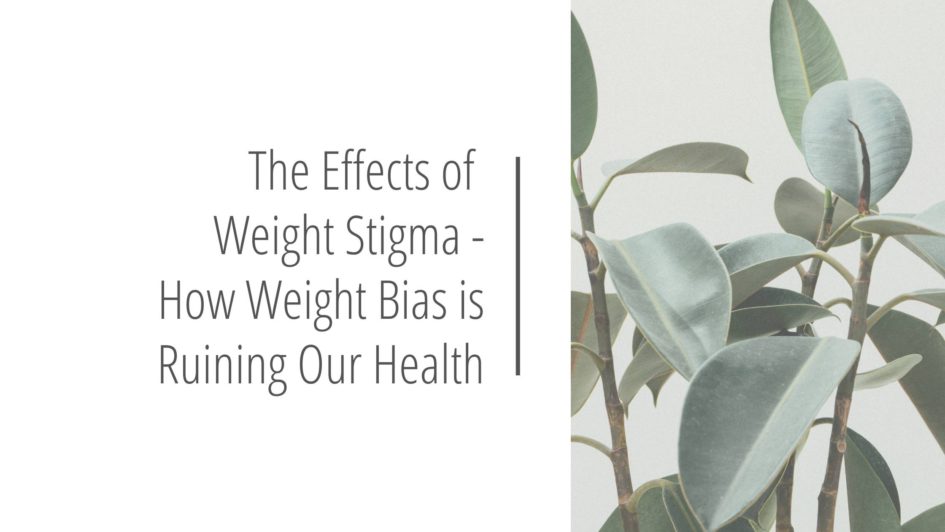Table of Contents
What is Weight Stigma?
Before we dive into the effects of weight stigma, let’s first talk about what exactly stigma is.
Weight stigma can be defined as negative attitudes, beliefs, judgments, discriminatory acts, or stereotypes that are aimed at individuals due to their weight. One of the most common and harmful settings for weight stigma is the healthcare system.
However, weight stigma isn’t only found in healthcare. It can be seen in places of employment, education settings, mass media, and even relationships with friends and family.
When it comes to healthcare specifically, the most common stereotypes expressed by healthcare providers include beliefs that large-bodied individuals are non-compliant, dishonest, lacking in self-control, weak-willed, unintelligent, unsuccessful, and lazy.
According to recent research, the prevalence of weight stigma, also known as weight discrimination or weight bias, has increased by more than 66% over the past decade. Although weight stigma has been documented for several decades, it is rarely challenged or condemned.
Unfortunately, the concept of weight stigma isn’t commonly known or is often overlooked. According to the Obesity Action Coalition (OAC), weight stigma is a major issue in today’s society.
Who Experiences Weight Stigma?
Research is showing that individuals who fall into the overweight or ob*se categories for BMI are the ones at the most risk of experiencing weight stigma.
Weight stigma does not have an age restriction and can be experienced at all ages. When it comes to gender, weight bias is more commonly experienced by females than it is by males, even at lower levels of excess weight (lower BMI).
According to the OAC, research suggests that women who are middle-aged or have a lower level of education, experience it at a significantly higher rate than male peers. For example, men reported experiencing degrading weight stigma at a BMI of 35 or higher while women reported experiencing an increase in weight stigma at a BMI of 27.
The Effects of Weight Stigma
The overall effects of weight stigma are harmful and degrading. It is dehumanizing and damaging. Experiencing weight stigma can lead to adverse physical and psychological health outcomes. Not only this, but it promotes a social norm that marginalizes a particular group of people.
Weight stigma is having a negative impact on our health and our healthcare system. Here’s why:
- It makes healthcare patients feel stigmatized
- Stigma can lead to depression, anxiety, and low self-esteem
- When patients feel stigmatization, they are less likely to adopt proposed or suggested health changes/improvements
- In order to cope with stigma, patients may even turn to unhealthy and damaging practices
- Stigmatized patients are more likely to avoid or cancel healthcare appointments that are needed for the prevention and treatment of disease and illnesses
- Avoidance of healthcare appointments can lead to exacerbation of diseases/illnesses due to lack of diagnosis identification, late identification, and absence of treatment plans
- Research shows that providers spent less time in appointments and engage less in health-related discussions with large-bodied patients in comparison to thin-bodied patients
To sum up the effects, weight bias is ruining our health.
Real-life Examples of Weight Stigma
If you don’t yet believe that weight stigma is not only real but is detrimental to our health, read the following real-life stories.
Patient A
Patient A went to the doctor with severe abdominal pain, nausea, and occasional vomiting upon food consumption. The doctor dismissed the symptoms and correlated them to the fact that the patient was most likely under a lot of stress due to relocating and starting a new job.
The patient also noted that she had recently lost weight due to a decrease in food intake secondary to her symptoms. The doctor voiced his value for the patient’s weight loss and insisted the patient wait until stress levels reduced to see if the symptoms decreased.
A few months later, the patient ended up in emergency surgery for gallstones that were blocking the common bile duct. This suggests that the symptoms were not completely related to stress and that the doctor had misinterpreted the symptoms due to the patient’s weight history.
Patient B
Patient B was experiencing severe pain with movement to the point that she could not walk into work from her car. Her primary care provider (PCP) recommended she see an orthopedist.
Patient B visited an orthopedist who told her the symptoms would be solved by losing weight, even though she had recently lost 70 pounds. The orthopedist diagnosed her with “ob*sity pain.”
This diagnosis provoked patient B to seek a second opinion. Patient B saw a different orthopedist who performed X-rays and diagnosed her with severe scoliosis. The second orthopedist recommended physical therapy and the patient’s symptoms soon improved.
Patient C
Patient C had not been to the doctor in over 5 years, despite the fact that she has polycystic ovarian syndrome (PCOS). This was because she was terrified of experiencing weight stigma from her PCP.
Due to the fear of stigma, the patient’s PCOS went untreated which increases the risk of infertility, irregular menstrual cycles, fatigue, hair loss, insomnia, and much more.
Summary: How Can We Help?
Clearly, weight stigma is a huge problem. Not only is it stigmatizing and dehumanizing, but it negatively effects the health of those impacted. So what can be done about it?
- Examine your own biases. Be honest and ask yourself, are you contributing to weight bias?
- Learn about the Health at Every Size (HAES) approach. Once you’ve learned about it, advocate and spread awareness!
- Spread awareness with the HAES and body positive products found in my anti-diet themed store!
Thanks for reading!
Rachel Beiler, MHS, RD, LDN


Leave a Reply